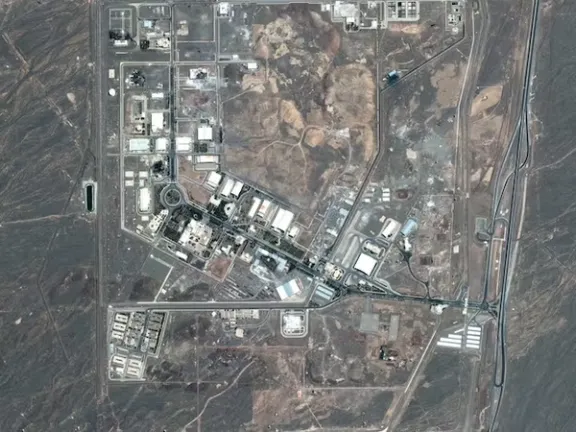Eight Pro-Iran Fighters Killed In Ambush In Eastern Syria
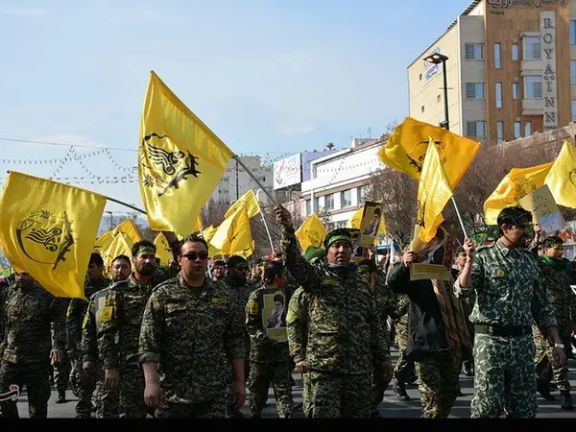
Eight Syrian fighters affiliated with Iran's Revolutionary Guards have been murdered after an ambush on their position in Deir Ezzor province in eastern Syria.

Eight Syrian fighters affiliated with Iran's Revolutionary Guards have been murdered after an ambush on their position in Deir Ezzor province in eastern Syria.
According to Rami Abdel Rahman, head of the Observatory, the eight murdered fighters "worked under the command" of Iran's Revolutionary Guards.
Deir Ezzor province is divided between US-backed Kurdish-led forces to the east of the Euphrates River and Iran-backed Syrian government forces and their allies to the west. Additionally, the Islamic State (IS) group remains active in the region.
Just a day earlier, the Observatory reported that gunmen killed three Syrians also affiliated with the Revolutionary Guards in an attack on a military position on the outskirts of Mayadeen city.
Since the onset of Syria's civil war in 2011, Iran-backed groups have provided support to President Bashar al-Assad's forces. Thousands of pro-Iran proxy fighters are stationed in Deir Ezzor province, as per the Observatory's estimates.
Although ISIS suffered territorial defeat in Syria in 2019, its remnants continue to carry out attacks, particularly in the expansive Badia desert stretching from the outskirts of Damascus to the Iraqi border.
The border area serves as a crucial segment of the route utilized by pro-Iranian armed groups to transport fighters, weapons, and commodities between Iraq and Syria.
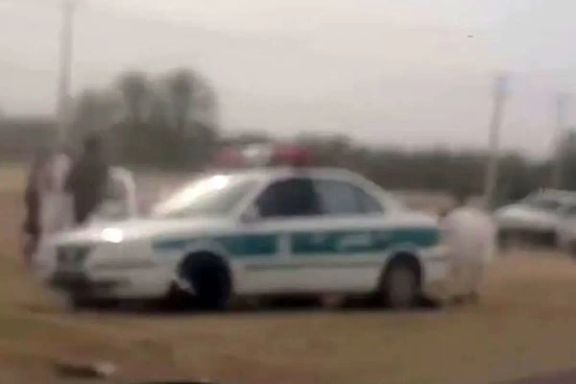
Six law enforcement officers have been killed by militants during an ambush on police vehicles in Sistan and Baluchestan province on Tuesday.
Jaish al-Adl, a militant group advocating for enhanced rights and improved living conditions for the Baluchi ethnic minority, has claimed responsibility for the attack. Over the past few years, the group has carried out multiple attacks on Iranian security forces in the province.
According to reports from rights group Halvash, the targeted police vehicles were on patrol along the Sib and Suran county route when they came under attack.
An informed source, speaking to the Baloch Activists Campaign, disclosed that the assailants from Jaish al-Adl utilized silencers during the ambush.
Tasnim News Agency, affiliated with the Islamic Revolutionary Guard, reported that five law enforcement officers were killed at the scene of the clash, with one succumbing to injuries after being rushed to the hospital due to the severity of the wounds.
The attack comes in the wake of previous deadly clashes between Jaish al-Adl and military forces on April 4 in the cities of Sistan and Baluchestan province, which lasted for more than 12 hours.
Iranian military sources confirmed the deaths of 18 members of the group in the clashes, with an additional 16 members of the Iranian forces losing their lives, 12 of whom were members of the IRGC, while four others were law enforcement personnel.
However, Jaish al-Adl has refuted the figures, claiming that the death toll of Iran’s military personnel stands at approximately 200.
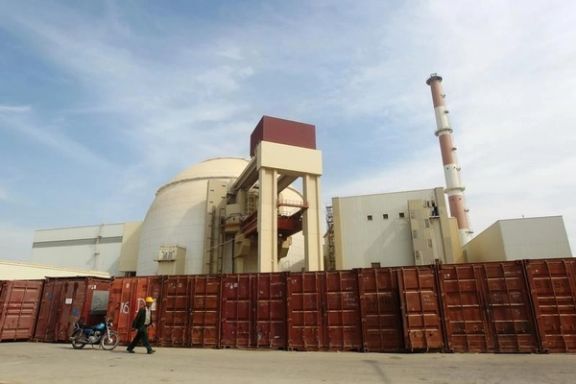
In the wake of last week's airstrike in Iran’s consulate in Damascus, Israel has reportedly indicated its readiness to target Iranian assets should Iran launch a direct retaliatory attack.
According to a report by the London-based Elaph News, citing an “anonymous Western security official,” Israel has been conducting air force drills, specifically preparing to target Iranian nuclear facilities and other critical infrastructure.
The airstrike killed Iranian Revolutionary Guard commander Mohammad Reza Zahedi, alongside six other senior members of the IRGC.
Although Israel has neither confirmed nor denied involvement in the strike, both Damascus and Tehran have blamed Israel.
However, unnamed US intelligence sources, as reported by CNN, suggest that Iran is unlikely to launch a direct attack, fearing retaliation from both the US and Israel.
Instead, Iran will more likely use its regional proxies, which since Iran-backed Hamas’s invasion of Israel on October 7, have launched attacks from Syria, Lebanon and Yemen.
Both Iran and its proxy groups, including Hezbollah, have pledged revenge for the strike. Iran's supreme leader Ayatollah Ali Khamenei's adviser has warned that Israeli embassies are no longer safe, while Hezbollah leader Hassan Nasrallah has promised an imminent Iranian response.
Israeli Prime Minister Benjamin Netanyahu said in a recent security cabinet meeting, “Iran has been acting against us for years — directly and via proxies. And, therefore, Israel acts against Iran and its proxies — defensively and offensively”.
As the Israeli military bolsters its manpower and defenses, Israeli Defense Minister Yoav Gallant announced that Israel has “completed preparations for a response against any scenario that would develop against Iran.”
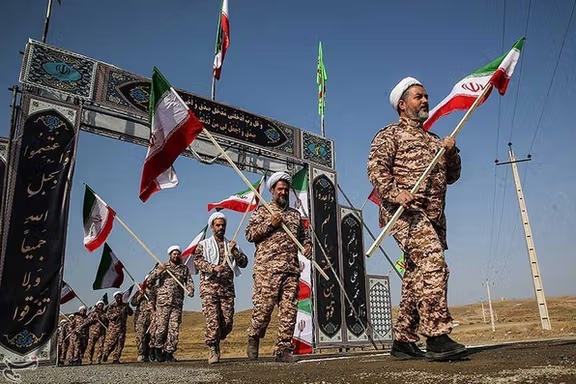
Media and citizens in Iran have been discussing the potential involvement of Russia and Syria in providing intelligence to Israel regarding the locations of IRGC officers prior to a precision strike last week.
Speculations are arising amidst calls from Iranian hardliners for a rapid and decisive reaction to the Israeli strike on April 1, targeting the Islamic Republic's Consulate in Damascus, resulting in the deaths of two top IRGC Quds Force generals and five other officers.
Meanwhile, Iranian officials and military commanders have maintained their stance that Iran will retaliate at a time of its choosing.
Conversely, reports in some Arab media outlets suggest that Iran might refrain from seeking revenge on Israel if Tel Aviv backs away from the notion of attacking Rafah in its conflict with Hamas.
In an editorial on April 8, Masih Mohajeri, the influential managing editor of Jomhouri Eslami daily, a newspaper that was founded by Ali Khamenei in 1979, asked: "Why Russia, which controls the Syrian airspace does not prevent air strikes on Iranian targets in Syria?" Also implicating Syria and possibly Iranian infiltrators in tipping off the Israelis, Mohajeri wrote: "We have had too many losses in Syria during the past months and this is certainly because of the treason by infiltrators."
Since December, Israel has eliminated 18 high ranking IRGC officers in Syria, in what appears to be a systematic campaign to limit the danger of Iranian proxies on its borders. Almost all the IRGC generals and officers stationed in Syria and Lebanon are tasked with directing and coordinating a mixture of Afghan, Iraqi, Syria and Lebanese proxy forces.
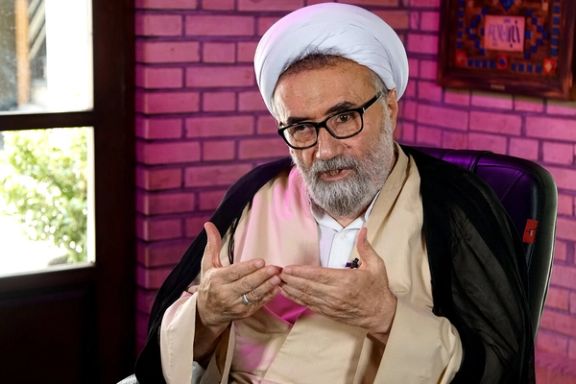
"We had warned about this repeatedly during the past months, but no one seems to have heard the warnings. Have Iranian officials ever asked themselves why such attacks never take place against Russian forces in Syria and why Russia's advanced air defense does not prevent Israel's crimes against Iran?"Jomhouri Eslami wrote.
The editorial emphasized that slogans like "replacing fallen officers with fresh blood" overlook the significant investment Iran has made in the expertise, skill, and efficiency of the highly trained officers who were lost. The publication highlighted Iran's robust intelligence and security capabilities, suggesting that these assets should be utilized to prevent such tragic losses in the future.
Advocating for a comprehensive review of Iran's security apparatus, the editorial posed critical questions: "Instead of boasting after each attack, why not prioritize preventive measures? Isn't it time to reassess our security posture?"
Meanwhile on social media, Ehsan Arian, an Iranian who appears to be an opposition activist with more than 23k followers, wrote more clearly about Syria's possible role in tipping off the Israelis. Arian wrote that it was clear since 2019 that Bashar al-Assad was simply tolerating the IRGC Qods Force's presence in Syria rather than welcoming it.
He suggested that Iranian security agencies have briefed the Supreme Council of National Security about the involvement of Syrian insiders and certain elements within the Iranian regime in the Israeli airstrikes targeting Iranian commanders and military advisers in Syria.
Iran had previously urged Syria to conduct a joint investigation into this matter following the killing of Seyed Razi Musavi in December. However, it seems that Iran has discovered that Syria's Intelligence organization and Presidential Guards impeded the investigation, as stated in the tweet from April 9.
The lengthy tweet continued to assert that subsequently, Iran and Hezbollah conducted a separate investigation, which revealed the involvement of Iranian infiltrators and Syrian agents. If these reports are confirmed, it is unlikely that Bashar Assad was unaware of them.
The tweet, however, did not dismiss the potential role of Russian forces collaborating with Syrian officers. Hezbollah acknowledges that many of its members killed in Israeli airstrikes since October 7 had some form of contact with Russian and Syrian intelligence, according to the tweet.
Other reports on social media also say Syrian officers who wish Iran to leave Syria give away the whereabouts of Iranian officers to Israelis.
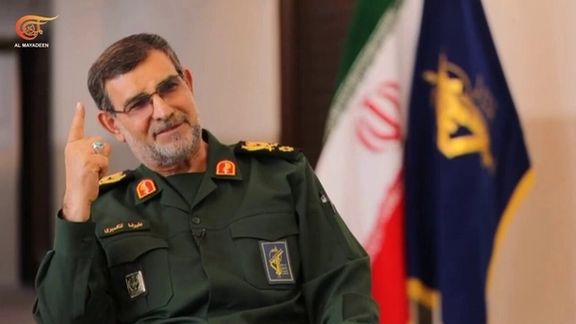
Frustrated over the apparent inaction of Iran after Israel's airstrike on the country's Damascus consulate, a senior Revolutionary Guard Commander has called for a coalition of Muslim armies to retaliate.
Alireza Tangsiri, Commander of the Navy of the IRGC, claimed that “the only way to confront Zionists is to create a coalition of Islamic armies,” the latest in a string of military top brass in Iran along with government officials to call for strong retaliatory action.
His comments come as an unconfirmed report suggests that Tehran made assurances to Washington that it would not retaliate against Israel following an airstrike that killed two IRGC commanders and five senior military officials in Syria.
The alleged agreement is seen by some as Tehran's attempt to avoid escalating tensions with both Israel and the United States, potentially in pursuit of sanctions relief. Speculation remains that Iran's proxies would carry out retaliatory attacks as opposed to Iran.
Since the outbreak of the Gaza war, triggered by Iran-backed Hamas's invasion of Israel, Iran's proxies have been attacking Israel from Gaza, the Lebanon border, Syria and from the Red Sea coast in the country's south.
While Iranian officials have issued threats of retaliation, led by the Supreme Leader, they have also exercised caution, claiming that they will act at an opportune time and under suitable conditions.
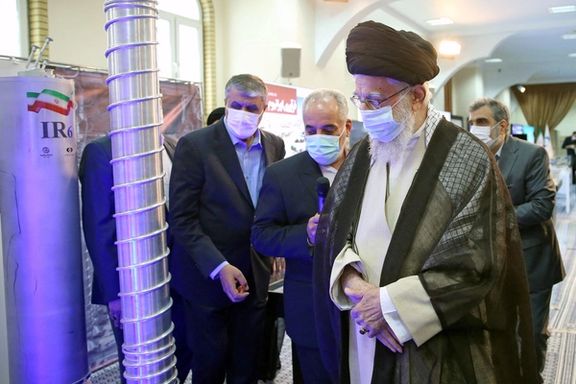
April 7 marked the sixth month of Hamas-Israel open conflict. Six days before this semi-anniversary, Israel’s April 1 strike on Iran’s embassy in Damascus punctuated an alarming turning point.
Israel's action did not only corner Hezbollah, Iran's primary quasi-state proxy on the bloody chessboard of their ongoing conflict but have also eliminated key military leaders. Amid various pundits attempting to predict Iran's next move, many are acknowledging the significant factor of Iran's nuclear program lurking in the background.
Supreme Leader Ali Khamenei's "fatwa" and opinion on the prohibition of producing nuclear weapons "may change tomorrow," Mahmoud-Reza Aghamiri, the president of Tehran's Beheshti University and a pro-regime professor of nuclear physics, told Iran's state TV this week. Aghamiri says Iran currently has the technology and capability to develop a nuclear bomb, and under such circumstances, developing it is easier than not making it.
The punditry and analyses on a possible “direct” clash between Iran and Israel is indeed all over the map. Some, whilst citing “warnings from unnamed Israeli officials behind the scenes” wonder whether or not Iran will strike Israel back from its own territory. Others probe whether it will have its proxies to escalate their asymmetrical strikes against Israel. And last but not least, a handful quibble over whether Israel’s strike would give President Joe Biden the occasion to proclaim support for Israel against Iran but further pressure Israel to heed the US’ demands on the conclusion of the war in Gaza and negotiations with Hamas for the release of the hostages.
On this very outlet, in an article published four days after Hamas attack on October 11, 2023, Benjamin Weinthal covered various sides of a debate on the (unlikely) possibility of a joint US-Israeli attack against Iran as a state sponsor of Hamas.
On the conventional front, The gravity of Israel’s situation cannot be exaggerated. The Hezbollah of Lebanon is armed with thousands of conventional rockets and cruise missiles that can potentially swarm and overwhelm the Israeli Air Defense Shield and Iron Dome and the analyses of Israel’s ability to take all Hezbollah’s arsenal preemptively has been the subject of much debate.
What most observers do not take into account is the possibility that the Israeli attack on the Iranian embassy in Damascus may trigger a rude awakening amongst the IRGC top brass and Khamenei. It might prompt them to hasten the development of their nuclear deterrence capabilities. Despite the regime's longstanding vow to eliminate Israel, dating back to before 1979, the tensions between Iran and Israel are mutual and deep-rooted.
Israel is presently wary of the Iranian ability to deploy a handful of nuclear warheads and the IDF has been preparing itself for a decisive strike on the Iranian nuclear facilities for quite some time before the Hamas October 7 attack on Israel. Israel, as is discussed below, has been acutely aware of Iran’s ever growing weaponization capacity as early as 2018.
Yet Israel’s collective sense of insecurity is not simply rooted in its fear of its enemies or the deep-seated collective trauma of the Holocaust. Israel’s primary source of insecurity is rooted in its historical roller coaster experience of its alliances. The Soviet de jure recognition of Israel and support for its war of independence against the Arab nations was short-lived and inadequate. France was Israel’s major military supplier for much of the 1950s to the mid-1960s, and upon her aid Israel developed its conventional and unconventional nuclear programs. But France proved unreliable when President De Gaulle sought a rapprochement with Israel’s Arab enemies and abandoned Israel in the mid-1960s. From the mid-1960s, the United States became Israel’s sole guarantor and ally in all aspects of economy and military from research and development, joint aeronautical and space projects to the development of the sophisticated air-defense systems, namely, “the Iron-Dome”, and the latest sophisticated UAVs.
The United States itself has wavered in its “unequivocal support” for Israel at least on three different occasions. First, President Dwight Eisenhower refused to support Israel in its collusion with the Anglo-French powers during the 1956 Suez Crisis. In fact, Eisenhower turned his back on Israel as he feared escalation with the Soviet Union. Incidentally, there are commentators who believe that President Biden should treat Prime Minister Benjamin Netanyahu to a similar set of measures that Eisenhower imposed on Israel in 1956.
There are indeed those in the US who believe Johnson failed to act to prevent Israel’s occupation of the West Bank in 1967 and this is a legacy from which Biden must take harsh lessons and act accordingly. Finally, President Barack Obama’s administration sidelined Israel’s Netanyahu to cajole Tehran’s ruling mullahs into the Joint Comprehensive Plan of Action (JCPOA) over their nuclear program causing Israel to distance itself ever farther from the Euro-American alliance. Israel has been less than forthcoming about sharing the details of its assassination and sabotage operations with its Euro-American allies ever since. According to some reports, “the CIA does not know” if Israel plans to bomb Iran.”
Today, Israel and Netanyahu are almost identical in their shared sense of insecurities. Even though a majority of Israelis may not vote him to office if elections were held today, they share the same sense of insecurity that has been the compass of his five mandates over the past thirty years. At the core of this sense of insecurity lies Iran’s nuclear program. Since 2018, Israel has taken possession of thousands of documents that lay bear all the militaristic directions of the Iranian nuclear program (Revealed: Emptying of the Iranian “Atomic Warehouse” at Turquz Abad). Over nearly 15 years, Israel is alleged to have succeeded in sabotaging many critical sites of the Iranian nuclear industrial complex. Moreover, Israel is accused of having masterminded the operations that eliminated Iranian nuclear scientists in the same period. Nonetheless, since Donald Trump left the JCPOA, the Iranian regime has progressively accelerated its uranium enrichment and proved Israel’s, read Netanyahu’s, worst fears. The International Atomic Energy Agency (IAEA) is effectively and totally is in the dark per the latest reports of IAEA and its dire warnings about the exact state of the Iranian nuclear program. In view of the above, it appears that Israel’s assassination and sabotage operations against the Iranian scientists and nuclear sites have effectively failed.
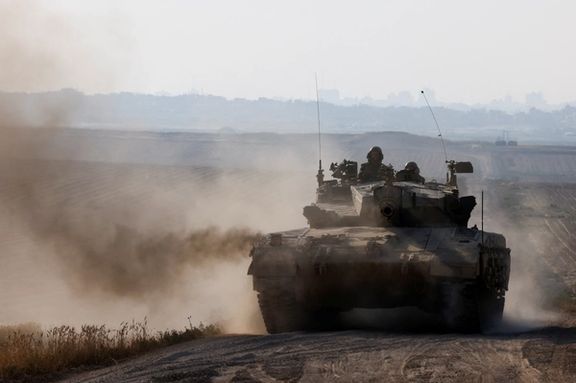
Israeli-American air forces joint drills for long range operations in the summer of 2023 revealed how alarmed both US and Israel were about the Iranian nuclear program. It was speculated at the time that such drills were to prepare both air forces for a joint operation on the Iranian nuclear facilities. Meanwhile, the Americans were in the midst of secret negotiation with the Iranians to reach an “informal nuclear agreement”.
However, joint exercises of such magnitude with any ally are always planned long in advance and are indicative of longstanding concerns. Accordingly, the joint US-Israeli hint at the fact that the Biden administration did neither have any confidence in the success of those secret negotiations with Iran, nor was it assured of the Iranian side’s honoring any such accord. Three weeks before Hamas attack on Israel, a most telling paragraph in the IDF statement on Israeli and Hellenic air forces’ joint drills for long range operations reads as follows: “The exercise is part of a series of exercises and models carried out by the IAF in the past year and their purpose is to improve operational and mental competence for long-range flights, refueling, attacks in the depth [of enemy territory] and achieving air superiority.”
Khamenei, per his religious edict, fatwa, has stated time and again that the manufacturing and usage of nuclear weapons is forbidden. However, Israel’s elimination of two high-ranking IRGC general inside the Iranian embassy’s compound in Damascus has established that there is no red line that it will not cross to maximize its security and minimize all risks. Such an escalating assault may cause the Iranian ruling clerics and the IRGC to wonder if their nuclear facilities will be next on Israel’s target list and they may consider attaining a deterrence greater than a conventional one. Khamenei may indeed invoke the principle of expediency to overrule his own “anti-Nuclear” fatwa. The principle of expediency, as decreed by the regime’s founder Ayatollah Khomeini in January 1988, stipulates that the Supreme Leader of the Islamic Republic may even violate the fundamental tenets of the Islamic faith in order to preserve “the Islamic Regime” as the preservation of the Islamic Regime supersedes all else.
Thus, if Israel continues to expand its unrelenting attacks on IRGC top brass and Iranian military and diplomatic facilities in the region, and the Iranian regime continues to plunge into the depths of a maelstrom of economic troubles, will Khamenei perceive such an assault as compromising the survival of the regime? And if so what will he do? Will he invoke the principle of expediency and order the rapid manufacturing of nuclear devices and their deployment in the form of a dozen or so warheads? Or will he be resigned to Israel’s overwhelming assault on its proxies and, like his predecessor, will drink from the poisonous chalice of surrender?
